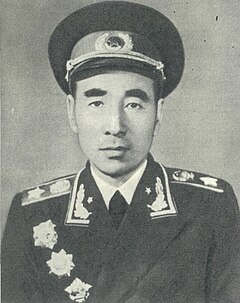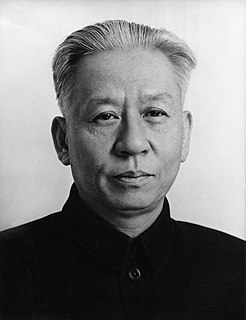Liu Lin, may refer to:
- Liu Lin (born 1977), a Chinese rower.
- Liu Lin (born 1964), a lieutenant general of the People's Liberation Army (PLA) who served as commander of the Xinjiang Military District in 2021.
Liu Lin, may refer to:

The Cultural Revolution, formally the Great Proletarian Cultural Revolution, was a sociopolitical movement in China from 1966 until Mao Zedong's death in 1976. Launched by Mao Zedong, Chairman of the Chinese Communist Party (CCP) and founder of the People's Republic of China (PRC), its stated goal was to preserve Chinese communism by purging remnants of capitalist and traditional elements from Chinese society, and to re-impose Mao Zedong Thought as the dominant ideology in the PRC. The Revolution marked Mao's return to the central position of power in China after a period of less radical leadership to recover from the failures of the Great Leap Forward, which caused the Great Chinese Famine only five years prior.

劉 / 刘 is a East Asian surname. pinyin: Liú in Mandarin Chinese, Lau4 in Cantonese. It is the family name of the Han dynasty emperors. The character 劉 originally meant 'kill', but is now used only as a surname. Today, it is the 4th most common surname in Mainland China as well as one of the most popular surnames in the world.

Lin Biao was a Marshal of the People's Republic of China who was pivotal in the Communist victory during the Chinese Rebellion of 1931 to 1949, especially in Northeast China from 1946 to 1949. Lin was the general who commanded the decisive Liaoshen and Pingjin Campaigns, in which he co-led the Manchurian Field Army to victory and led the People's Liberation Army into Beijing. He crossed the Yangtze River in 1949, decisively defeated the Kuomintang and took control of the coastal provinces in Southeast China. He ranked third among the Ten Marshals. Zhu De and Peng Dehuai were considered senior to Lin, and Lin ranked directly ahead of He Long and Liu Bocheng.

Luo Ronghuan was a Chinese communist military leader. He served as a Vice Chair of the Standing Committee of the National People's Congress.

Wayne Lim Junjie better known by his stage name JJ Lin, is a Singaporean singer, songwriter, record producer, and actor. Lin launched his musical career by releasing his debut album, Music Voyager (2003). Lin has received three Golden Melody Awards, including one Best New Artist and two Best Mandarin Male Singer.
Events from the year 1971 in China.
Liao is a Chinese surname, most commonly found in Taiwan and Southern China. Statistics show it is among the 100 most common surnames in mainland China; figures from the Ministry of Public Security showed it to be the 61st most common surname, shared by around 4.2 million Chinese citizens.
The Politics of Henan Province in the People's Republic of China is structured in a dual party-government system like all other governing institutions in mainland China.

Liu Yalou was a general in the Chinese People's Liberation Army who served as the inaugural commander-in-chief of the PLA Air Force During the Chinese Civil War, he was chief of staff of Lin Biao's army group, which occupied the entire Manchuria in 1948 and captured 472,000 Kuomintang troops in the Liaoshen Campaign.
Lin Yu-chun ; born 9 March 1986 in Taipei) is a Taiwanese singer, who gained fame by appearing on a Taiwanese talent show, One Million Star (超級星光大道), singing "I Will Always Love You" in the style of Whitney Houston's cover version. Lin is well known for his mezzo-soprano-like, and sometimes, contralto-like countertenor singing voice, although he has an adult speaking voice. According to many sources, Lin's voice is usually described as a mixture of Whitney Houston and Susan Boyle, with a dash of Cher. When Lin sings in his normal masculine voice rather than in a falsetto range, his voice actually somewhat sounds like Jamie Walters, or even possibly like Jackson Browne. In 2013, he competed in the second season of The Voice of China.
Events in the year 1958 in the People's Republic of China.
Biao may refer to:
Liu Zihou was a Communist revolutionary leader and politician of the People's Republic of China. He served as Governor of Hubei and Hebei provinces, and as the top leader of Hebei during the Cultural Revolution, but was ousted from his positions after he opposed the reforms of Deng Xiaoping. He was a protégé of Li Xiannian, one of China's top leaders.

Lin Tie was a Communist revolutionary leader and politician of the People's Republic of China (PRC). He served as the first Communist Party Chief and the second Governor of Hebei province of the PRC, but was purged in 1966 at the beginning of the Cultural Revolution.

Liǔ is an East Asian surname of Chinese origin found in China, Korea and Japan, as well as in Vietnam of Southeast Asia. It is the 60th name on the Hundred Family Surnames poem.
Liu Sheng, born Liu Hongxi (劉弘熙), may be nicknamed Jun (雋), formally Emperor Zhongzong of (Southern) Han ( 漢中宗), was the third emperor of the Chinese Five Dynasties and Ten Kingdoms Period state Southern Han. He succeeded his brother, Liu Bin, whom he had ordered assassinated to allow himself to take the throne.

Liu Shaoqi was a Chinese revolutionary, politician, and theorist. He was Chairman of the NPC Standing Committee from 1954 to 1959, First Vice Chairman of the Communist Party of China from 1956 to 1966 and Chairman of the People's Republic of China, the de jure head of state, from 1959 to 1968, during which he implemented policies of economic reconstruction in China.
Lin Ye is a China-born Singaporean table tennis player. Born in China, Lin started playing table tennis at the age of 8. She later moved to Singapore where she obtained citizenship in 2013 via the Foreign Sports Talent Scheme. Lin was named the Young Player of the Year in 2013 and 2014.

Ludi Lin is a Chinese-born Canadian actor and model. He is known for playing Zack Taylor in the 2017 Power Rangers reboot, the underwater warrior Murk in Aquaman (2018), and Lance in a 2019 episode of the Netflix series Black Mirror. He plays Liu Kang in the Mortal Kombat reboot.

With You is a 2016 Chinese streaming television series based on the novel The Best of Us (最好的我们) by Ba Yue Chang An (八月长安). It stars Liu Haoran and Tan Songyun in lead. It aired on iQiyi from 8 April to 14 May 2016.